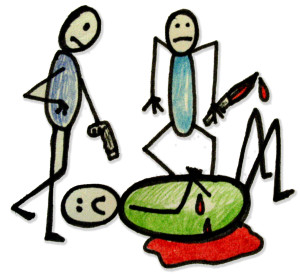We post news and comment on federal criminal justice issues, focused primarily on trial and post-conviction matters, legislative initiatives, and sentencing issues.

IS SCOTUS TEEING UP § 922(g)(1)?
What would you call someone who is prohibited from possessing a gun but is surrounded by a heavily armed detail?
For now, you’d be right to say it’s a federal inmate on a U.S. Marshal Service prisoner transport. But after next week, you’d be equally correct to say, “President Trump.”

After his January 10 New York sentencing, Trump has something in common with the approximate 10 million Americans prohibited from possessing guns by 18 USC § 922(g)(1), the so-called felon-in-possession statute. Although convicted of 34 of the most anodyne felonies imaginable – paying off a porn star to keep an embarrassing story quiet during his presidential campaign and then hiding the payment as a “legal fee” – Trump is forever prevented from having a gun or ammo by the F-I-P statute, no different from a murderer or drug dealer or tax evader or food stamp fraudster.
This is important because the issue of whether § 922(g)(1) can ban everyone ever convicted of a felony from possessing guns consistent with the 2nd Amendment – a question that is increasingly splitting the federal circuits – may be on the cusp of being accepted for Supreme Court review.
F-I-P “probably does more to combat gun violence than any other federal law,” Justice Samuel Alito proclaimed in his 2019 Rehaif v. United States dissent. “It prohibits the possession of firearms by, among others, convicted felons, mentally ill persons found by a court to present a danger to the community, stalkers, harassers, perpetrators of domestic violence and illegal aliens.”
 Justice Alito’s soaring if evidence-free endorsement of § 922(g) came several years before the Supreme Court’s 2022 New York State Rifle & Pistol Assn. v. Bruen and last June’s United States v. Rahimi decisions suggested that whatever the efficacy of § 922(g), its constitutionality was dubious.
Justice Alito’s soaring if evidence-free endorsement of § 922(g) came several years before the Supreme Court’s 2022 New York State Rifle & Pistol Assn. v. Bruen and last June’s United States v. Rahimi decisions suggested that whatever the efficacy of § 922(g), its constitutionality was dubious.
After Rehaif, SCOTUS remanded a host of pending § 922(g) petitions for review for application of its standards. Now, many of those cases – and several fresh ones – are coming back to the Supreme Court. In one of those cases, United States v. Daniels, the 5th Circuit ruled in 2023 that § 922(g)(3) – that prohibited drug users from possessing guns – violated the 2nd Amendment. The government sought SCOTUS review, and the high court remanded the court for reconsideration in light of Rahimi. Last week, the 5th Circuit upheld its earlier decision that Mr. Daniels, although using pot about every other day, could not be prevented from owning a gun under the 2nd Amendment when Bruen and Rahimi standards were applied to his situation.
Last week, The New York Times wrote about the coming battle over whether the F-I-P statute comports with the 2nd Amendment, and – if so – to what extent. The Times observed that Bruen and Rahimi “interpreted the 2nd Amendment in a way that puts major parts of the [F-I-P] law at risk and has left lower courts in, as one challenger put it, a ‘state of disarray.’”
Bruen and Rahimi held that if the conduct addressed by a gun law falls within the 2nd Amendment’s protection – like possession of a gun or ammo certainly does – then the law that regulates that conduct must comport with the principles underlying the 2nd Amendment.
“For example,” Rahimi explained, “if laws at the founding regulated firearm use to address particular problems, that will be a strong indicator that contemporary laws imposing similar restrictions for similar reasons fall within a permissible category of regulations. Even when a law regulates arms-bearing for a permissible reason, though, it may not be compatible with the right if it does so to an extent beyond what was done at the founding. And when a challenged regulation does not precisely match its historical precursors, “it still may be analogous enough to pass constitutional muster.”
 The question is no mere angels-on-the-head-of-a-pin argument. Over 7,000 people were convicted under § 922(g)(1) in FY 2022. The last head count (taken in 2010) found more than 19 million Americans have felony convictions and are thus disqualified from possessing guns under § 922(g)(1).
The question is no mere angels-on-the-head-of-a-pin argument. Over 7,000 people were convicted under § 922(g)(1) in FY 2022. The last head count (taken in 2010) found more than 19 million Americans have felony convictions and are thus disqualified from possessing guns under § 922(g)(1).
Last month, the 3rd and 4th Circuits issued opinions on the constitutionality of F-I-P, with each coming out differently on the issue. An en banc decision in United States v. Duarte is pending in the 9th Circuit. Today, SCOTUS denied review to Dubois v. United States, where the defendant was convicted of F-I-P for a 10-year-old marijuana possession felony. Instead, the Supreme Court GVR-ed the case for 11th Circuit reconsideration in light of Rahimi.
 Regardless of SCOTUS action in Dubois, the § 922(g)(1) issue is ripe for review. Even before any government request that may be filed asking for Supreme Court review of Range v. Attorney General, there are no fewer than 15 petitions for certiorari pending on F-I-P constitutionality. Ohio State law professor Doug Berman, writing in his Sentencing Law and Policy blog, said last week, “[T]here is a wide array of churning lower-court litigation assailing gun restrictions well beyond federal criminal prohibitions in 18 USC § 922(g), and so it is certainly possible that the Justices might take up disputes over restrictions on types of guns or other regulatory matters before addressing federal possession prohibitions again. In addition, because the incoming Trump administration could be more supportive of a more expansive view of the 2nd Amendment, the Supreme Court’s approach to § 922(g) disputes might get influence by some new advocacy coming soon from the Justice Department.”
Regardless of SCOTUS action in Dubois, the § 922(g)(1) issue is ripe for review. Even before any government request that may be filed asking for Supreme Court review of Range v. Attorney General, there are no fewer than 15 petitions for certiorari pending on F-I-P constitutionality. Ohio State law professor Doug Berman, writing in his Sentencing Law and Policy blog, said last week, “[T]here is a wide array of churning lower-court litigation assailing gun restrictions well beyond federal criminal prohibitions in 18 USC § 922(g), and so it is certainly possible that the Justices might take up disputes over restrictions on types of guns or other regulatory matters before addressing federal possession prohibitions again. In addition, because the incoming Trump administration could be more supportive of a more expansive view of the 2nd Amendment, the Supreme Court’s approach to § 922(g) disputes might get influence by some new advocacy coming soon from the Justice Department.”
Certainly, the fact that the new President himself is disqualified from possessing any of the nearly 5 million guns owned by the very government he will again command in a week may influence the position his Dept. of Justice takes in any Supreme Court F-I-P litigation.
New York Times, Courts in ‘State of Disarray’ on Law Disarming Felons (January 6, 2025)
New York State Rifle & Pistol Assn. v. Bruen, 597 U.S. 1 (2022)
Rehaif v. United States, 588 U.S. 225 (2019)
United States v. Rahimi, 602 U.S. 680 (2004)
United States v. Daniels, Case No. 22-60596, 2025 U.S. App. LEXIS 208 (5th Cir. January 6, 2025)
Sentencing Law and Policy, What kind of Second Amendment case will be next for SCOTUS after Bruen and Rahimi? (January 8, 2025)
– Thomas L. Root


 The 5th said Jeremy’s “violent aggravated battery conviction is analogous to, and arguably more dangerous than, the ‘prototypical affray [which] involved fighting in public,’ the precursor to the ‘going armed’ laws punishable by arms forfeiture… These affray and going armed laws were intended to “mitigate demonstrated threats of physical violence similar to that displayed by Schnur when he perpetrated the aggravated battery offense [and] supports a tradition of disarming individuals like Schnur pursuant to § 922(g)(1), whose underlying conviction stemmed from the threat and commission of violence.”
The 5th said Jeremy’s “violent aggravated battery conviction is analogous to, and arguably more dangerous than, the ‘prototypical affray [which] involved fighting in public,’ the precursor to the ‘going armed’ laws punishable by arms forfeiture… These affray and going armed laws were intended to “mitigate demonstrated threats of physical violence similar to that displayed by Schnur when he perpetrated the aggravated battery offense [and] supports a tradition of disarming individuals like Schnur pursuant to § 922(g)(1), whose underlying conviction stemmed from the threat and commission of violence.”





















